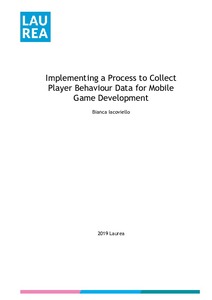Implementing a Process to Collect Player Behaviour Data for Mobile Game Development
Iacoviello, Bianca Doralice (2019)
Avaa tiedosto
Lataukset:
Iacoviello, Bianca Doralice
2019
All rights reserved. This publication is copyrighted. You may download, display and print it for Your own personal use. Commercial use is prohibited.
Julkaisun pysyvä osoite on
https://urn.fi/URN:NBN:fi:amk-2019121025746
https://urn.fi/URN:NBN:fi:amk-2019121025746
Tiivistelmä
The objective of this thesis project was to implement a process to collect player behaviour data for mobile game development. The company was a hypercasual mobile games developer based in Helsinki. The implementation of the process to collect player behaviour data for mobile game development is meant to align with the strategy and mission that the company adopted in 2018 for developing hypercasual mobile games and support the company’s stakeholders in their need for informed decision-making.
The video games industry has a shorter history compared to other media-based industries. Moreover, mobile games have existed for less than 25 years. For this reason, the knowledge base for this thesis includes a description of the video gaming industry, its background, global market value. The knowledge base also covers the general games’ classifications by platforms, such as pc games, console games and mobile games, the games genres, such as triple A, action and hypercasual, as well as the workflow and structures of game development teams.
The research methodology applied for this study was a participatory action research with a qualitative approach for data collection and analysis. Therefore, the first phase was to diagnose the state of the data collection at the company, followed by action planning for implementing the process to improve the data collection, followed by an evaluation of the results derived from the process implementation and the documentation of the learnings.
Additionally, the research included data cross-referencing and triangulation. Furthermore, the data gathered included gaming industry literature, academic journals, experts’ blogs, the researcher’s own experiences and observations and an open-ended discussion with key stakeholders from the company.
The outcome of this thesis was the implementation of a process to collect players’ behaviour data for mobile game development. By providing clarification of the roles and inputs the implemented process has enabled a continuous workflow for the game development teams. Furthermore, the implementation of the process facilitates the stakeholders’ evaluation of the game’s performance and allows them to make informed decisions on whether or not to continue a game’s iteration. In addition to the decision-making improvement, the team learnt that standardizing the collection of events and parameters still allows to identify points for improvement.
The video games industry has a shorter history compared to other media-based industries. Moreover, mobile games have existed for less than 25 years. For this reason, the knowledge base for this thesis includes a description of the video gaming industry, its background, global market value. The knowledge base also covers the general games’ classifications by platforms, such as pc games, console games and mobile games, the games genres, such as triple A, action and hypercasual, as well as the workflow and structures of game development teams.
The research methodology applied for this study was a participatory action research with a qualitative approach for data collection and analysis. Therefore, the first phase was to diagnose the state of the data collection at the company, followed by action planning for implementing the process to improve the data collection, followed by an evaluation of the results derived from the process implementation and the documentation of the learnings.
Additionally, the research included data cross-referencing and triangulation. Furthermore, the data gathered included gaming industry literature, academic journals, experts’ blogs, the researcher’s own experiences and observations and an open-ended discussion with key stakeholders from the company.
The outcome of this thesis was the implementation of a process to collect players’ behaviour data for mobile game development. By providing clarification of the roles and inputs the implemented process has enabled a continuous workflow for the game development teams. Furthermore, the implementation of the process facilitates the stakeholders’ evaluation of the game’s performance and allows them to make informed decisions on whether or not to continue a game’s iteration. In addition to the decision-making improvement, the team learnt that standardizing the collection of events and parameters still allows to identify points for improvement.
